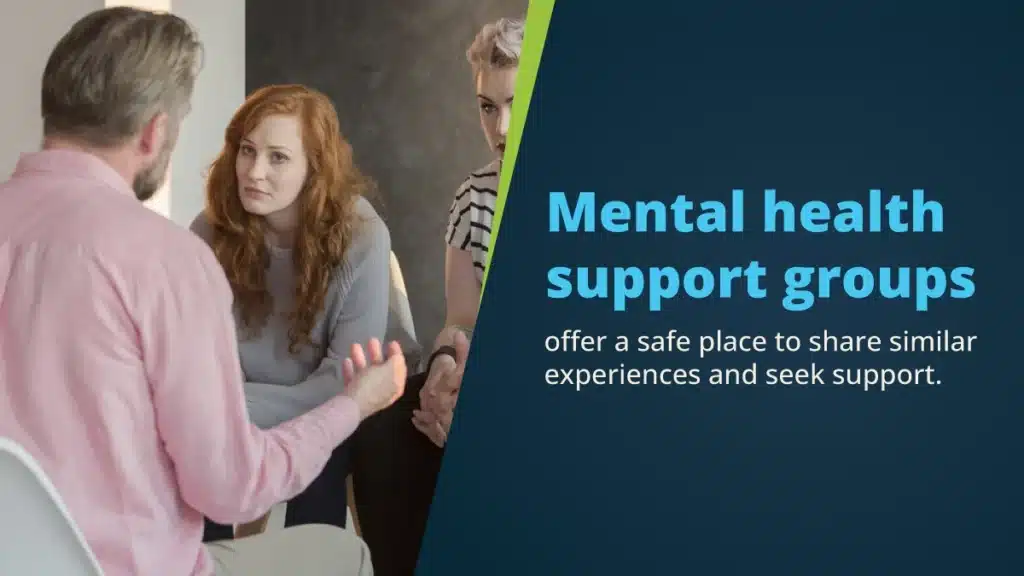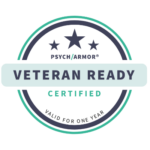Mental health groups serve as vital lifelines for those navigating the complexities of mental illness.
At their core, mental health support groups offer a safe space for individuals to share their experiences, vulnerabilities, and triumphs without fear of judgment. In this article, we’ll explore the different types available and how to find the right group for you.

Key Takeaways
Mental health support groups provide valuable tools for individuals navigating mental health issues. Here is what this article covers:
- Mental health support groups offer a safe place to share similar experiences and seek support.
- Various types of mental health support groups exist, catering to the diverse needs of various ages.
- Seek recommendations and explore online and local resources to find the right group for you.
If you’re battling mental health issues, seek immediate assistance at The Haven Detox-South Florida. Dial (561) 328-8627 for details of our services!
Types Of Mental Health Support Groups
Mental health support groups offer invaluable assistance and solidarity to individuals coping with various mental health conditions. Here’s a breakdown of different types of mental health support groups.
Professionally-Led Support Groups
Professionally-led support groups are typically facilitated by mental health professionals such as psychologists, counselors, or therapists. These groups often follow a structured model and offer expert guidance to participants.
Psychotherapy Groups: Led by licensed therapists, these groups focus on specific therapeutic approaches such as cognitive-behavioral therapy (CBT). Participants engage in discussions and skill-building sessions and receive personalized guidance from the therapist.
Family Support Groups: These groups are led by counselors and are designed to support family members and caregivers of those with mental illnesses. For example, the NAMI Family Support Group and family therapy provide education, coping skills, and a safe space for sharing emotions and experiences.
Trauma Recovery Groups: Led by trauma specialists, these groups offer support and healing for individuals who have experienced traumatic events. Group members learn coping skills, process emotions, and receive validation in a supportive environment.
Peer-Led Support Groups
Peer support groups are led by individuals who have personal experience with mental health challenges. These groups offer a sense of community, understanding, and validation among members who share similar lived experiences.
Recovery International: Recovery International offers peer-led support groups based on the principles of cognitive-behavioral therapy (CBT) for those struggling with various mental health challenges, including anxiety, depression, and other mood disorders.
Faith-Based Support Groups: Rooted in religious or spiritual beliefs, these groups offer emotional and spiritual support to those facing mental health issues. Led by members of religious communities, these groups incorporate prayer, scripture readings, and fellowship into their meetings.
12-Step Programs: While primarily focused on drug addiction recovery, 12-step programs often incorporate discussions about mental health. These peer-led groups provide a non-judgmental space for individuals struggling with substance use disorders (SUDs) and co-occurring mental health challenges.
Online Support Groups
Online mental health support groups utilize digital platforms to connect individuals facing similar mental health issues. These groups offer convenience, anonymity, and accessibility for those with difficulty accessing in-person support.
7 Cups: 7 Cups is an online platform that offers peer support through anonymous chats with trained listeners. Users can connect with volunteers who provide empathetic listening, emotional support, and guidance for various mental health problems.
Reddit Mental Health Subreddits: Reddit hosts a lot of online communities dedicated to mental health topics, including r/anxiety, r/depression, r/ADHD, and more. These subreddits allow individuals to share their experiences anonymously, seek advice, and offer support to others.
Online Therapy Platforms: Some online therapy platforms offer group therapy sessions conducted by licensed therapists via video conferencing. These sessions provide a virtual space for individuals to receive professional guidance, interact with peers, and work towards their treatment goals.
Support Groups For Specific Mental Health Conditions
These support groups cater to individuals diagnosed with particular mental health disorders, offering specialized information, validation, and support tailored to their needs.
Depression and Bipolar Support Alliance (DBSA): DBSA facilitates support groups specifically for individuals living with depression or bipolar disorder. These groups provide a safe and sympathetic environment for sharing personal stories, coping strategies, and recovery insights.
Anxiety and Depression Association of America (ADAA): ADAA offers in-person and virtual support groups for people struggling with anxiety disorders, depression, OCD, PTSD, and related conditions. These groups focus on education, coping skills, and peer support.
National Alliance on Mental Illness (NAMI): NAMI provides support groups for various mental illnesses, including schizophrenia, PTSD, and eating disorders, as well as groups for family members and caregivers. These groups offer empathy, resources, and advocacy for individuals and their loved ones.
Each type of mental health support group offers valuable resources and connections for individuals seeking support. It is crucial to be the part of one that best fits your needs and condition.
How To Find The Right Mental Health Support Group
Finding the right mental health support group can greatly enhance your well-being. Here are steps to guide you:
Identify Your Needs: Determine what specific challenges you’re facing. Whether it’s anxiety, depression, addiction, or grief, pinpointing your needs will help you find a group tailored to your situation.
Research: Look for support groups in your area through online directories, community centers, or mental health organizations. Consider factors like location, meeting frequency, and focus areas.
Check Credentials: Ensure the group is facilitated by licensed professionals or reputable organizations. Verify their credentials and ask about their approach to mental health support.
Attend Meetings: Attend a few meetings to get a feel for the group dynamics and atmosphere and whether it aligns with your preferences and comfort level.
Assess Compatibility: Reflect on how well you connect with other members and whether you feel supported and understood. A compatible group fosters trust and encourages open communication.
Evaluate Effectiveness: Assess whether the group provides valuable insights, coping strategies, and emotional support. It should contribute positively to your mental health journey.
Seek Feedback: Gather feedback from current or past members about their experiences with the group. Their perspectives can offer valuable insights into its effectiveness.
Remember, finding the right support group may take time and exploration. Trust your instincts and prioritize your comfort and well-being throughout the process.
Frequently Asked Questions (FAQs)
How do I find a local support group?
To find a local support group, check online directories, community centers, or hospitals, or ask your healthcare provider. Consider reaching out to a variety of organizations related to your specific needs for further assistance
What is the purpose of a mental health support group?
A mental health support group provides an opportunity for people facing similar challenges to come together and share experiences and offer mutual understanding, coping strategies, and emotional support.
How can I find support and resources for managing mental health issues?
You can find support and resources for managing mental health issues through therapy, support groups, online forums, helplines, community centers, mental health apps, and educational websites.
The Haven Detox-South Florida: Where Recovery Begins
Are you feeling overwhelmed by mental health struggles? You’re not alone. At The Haven Detox-South Florida, our caring team is here for you.
Our comprehensive mental health treatment options are designed to provide you with the care and support you need to thrive. Through evidence-based therapies, expert medication management, and holistic approaches, we’re dedicated to helping you find balance and peace of mind. Don’t wait to take the first step towards healing. Call us today at (561) 328-8627. Let’s start your journey together towards a better life.






